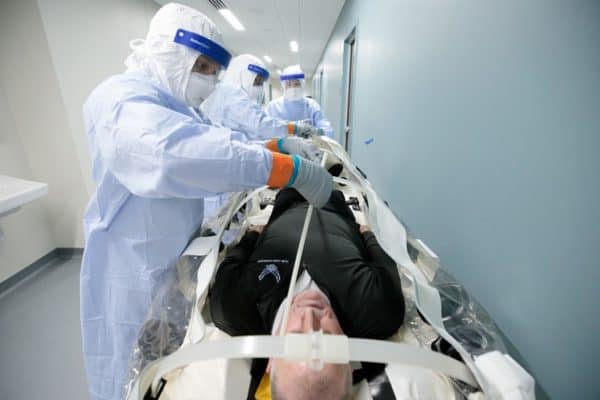The U.S. Air Force School of Aerospace Medicine is developing a training program with the University of Nebraska Medical Center through the Center for Sustainment of Trauma and Readiness Skills Omaha program to best prepare medical airmen to respond to infectious disease threats that could impact military personnel and operations. The program launched in 2018 and airmen are set to begin taking classes in October.
“This partnership is vital to the readiness of our medical airmen,” said Lt. Col. Elizabeth Schnaubelt, C-STARS Omaha medical director. “As military personnel deploy to diverse geographic areas, they may encounter infectious disease threats. These hazardous and communicable threats can be naturally occurring or deliberate and have a significant impact to our operations. Military personnel that work with such patients must know the proper procedures to protect patients, themselves and the mission.”
The need for specialized infectious disease treatment and management training became clear after the 2014-2016 Ebola outbreak in West Africa. U.S. service members deployed to the region to support the crisis. Although U.S. forces did not directly treat Ebola patients, the risks to U.S. service members was evident.
“The DoD identified a knowledge and training gap in our capability to safely care for these types of patients while protecting our medical personnel,” said Schnaubelt. “The Air Force only had a few people with that level of specialized training and that puts us and our patients at risk.”
Development of a training platform focused on highly hazardous infectious diseases became a priority for the Air Force. The C-STARS Omaha program maximized the existing partnership Offutt Air Force had with the University of Nebraska Medical Center.
The first C-STARS Omaha class will be on principles of biocontainment care, initially open to infectious disease physicians and infection prevention specialists. The course will cover topics like recognition, diagnosis and management of highly hazardous infectious diseases; infection prevention and control principles; and safe donning and doffing of personal protective equipment.
This partnership gives Air Force medics access to leaders in the field of biocontainment care with decades of experience. Students will be able to practice using one of the few biocontainment units in the U.S. selected to care for Ebola patients. University of Nebraska Medical Center facilities are also equipped with specialized simulation training labs to train health care personnel on infectious disease treatment.

C-Stars at work in the Training, Simulation and Quarantine Center (TSQC) inside the Global Center for Health Security on the University of Nebraska Medical Center campus in Omaha, Nebraska on Friday, January 3, 2020. Image credit: US Air Force.
“There are few institutions in the U.S. with interdisciplinary teams and specialized training who have safely and successfully treated patients in biocontainment units,” said Schnaubelt. “Their expertise in treatment and training is extremely valuable for the Air Force and our medics.”
The Omaha program is the fourth and newest C-STARS partnership, and the only one focused on infectious diseases. The C-STARS program is part of the Air Force Research Lab’s 711th Human Performance Wing. C-STARS partnerships give medical airmen advanced training at civilian hospitals in skills needed in an operational setting, like trauma surgery. With the addition of C-STARS Omaha, this training platform will continue to evolve to ensure medical airmen remain current and ready.
“Each C-STARS site provides exposure to complex patients and diagnoses that our airmen don’t routinely see at their home station,” said Lt. Col. Kathleen Grimm, Air Force Clinical Readiness Operations chief. “With the addition of C-STARS Omaha, we have an opportunity to continue evolving and expanding our training to meet future readiness requirements and ensure medical airmen can deliver lifesaving care in any operational setting.”
